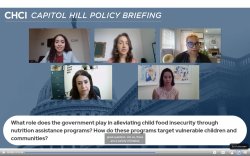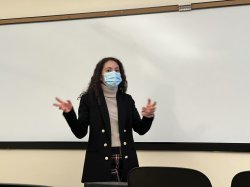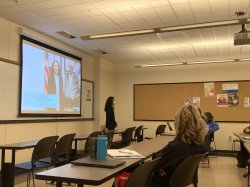Fighting for Healthy Food for Kids
How one recent graduate is playing a key role in child nutrition policy in the United States
Posted in: Alumni, Health, Homepage News, Science and Technology, University

Montclair State University graduate Isabella Paz Baldrich ’19, BS in Nutrition and Food Science, has spent months on Capitol Hill, immersed in the nitty-gritty of policy work, including the wording of legislation designed to address food insecurity among America’s children.
The 25-year-old dietitian will wrap up a nine-month graduate fellowship with the Congressional Hispanic Caucus Institute (CHCI) in May. As a CHCI PepsiCo nutritional health graduate fellow, she is working with the U.S. House of Representatives’ Committee on Education and Labor, which oversees child nutrition programs. The committee has jurisdiction over the National School Lunch Program, the School Breakfast Program, the Child and Adult Care Food Program and more, Paz Baldrich explains. One of only 10 CHCI graduate fellows chosen from across the country after an intensive five-month interview and selection process, she has done a deep dive into the Child Nutrition Reauthorization (CNR) Act, which expired in 2015.
“It’s supposed to happen every five years but there have been unsuccessful attempts. So, we’re trying to do this this year, mostly because next year the Senate is going to pivot to tackle the Farm Bill,” Paz Baldrich says. “This is the only window of opportunity that we can do this.”

In her role as a fellow, Paz Baldrich has been gathering input from child nutrition advocacy groups and other stakeholders to help strengthen the CNR Act. “We’re trying to modernize and expand the guidelines so that more kids can be eligible,” she says. “Also strengthening the nutrition standards to align with the dietary guidelines, that’s one of our priorities.”
Paz Baldrich is passionate about food equity, particularly when it comes to children and their development. She is particularly interested in expanding the Special Supplemental Nutrition Program for Women, Infants, and Children, more commonly known as WIC, which provides assistance to children until they are 5.
“Some kids, when they’re 5, they’re not in kindergarten, so they’re not covered under a school-meal program, so we’re trying to extend it to age 6, or until their first day of kindergarten in order to fill in that gap,” she explains.
She’s also concerned with expanding school free-lunch programs. “Because of COVID, all kids in schools are eligible for free meals. But before COVID, that was not the case; either you paid full price, reduced price or you got a free meal. So, one of the biggest things that we’re trying to do is get more kids to be eligible for free meals. This is as close as we can get to universal school meals, which would be the ideal situation.”
Paz Baldrich recently moderated a panel of health and nutrition experts on “The Effects of Food Insecurity on Child Development: A Focus on Hispanic and Latino Children Living in the U.S.” as part of a four-day 2022 CHCI Capitol Hill Policy Briefing Series.

She was introduced by U.S. Rep. Robert Scott, D-VA, who chairs the House Committee on Education and Labor, and is sponsoring the reauthorization act.
“Isabella has played and will continue to play an instrumental role in helping draft legislation for this reauthorization,” Scott says. “Our committee has been extremely fortunate to have Isabella bring her perspective, not only as a CHCI graduate fellow, but also as a registered dietitian nutritionist. Through Isabella’s studies as an undergraduate nutrition major at Montclair State University, she began to comprehend the complexities involved with food equity and the government’s role in combating food insecurity.”
All of Paz Baldrich’s experiences as a young child on a free-lunch program and her studies in nutrition, “are all absolutely valuable in the legislative work that she manages,” Scott says.
A Dietitian Goes to Washington
Shortly after arriving in Washington, D.C., for her fellowship, Paz Baldrich reached out to her former professor Lauren Dinour to thank her. “She’s the reason why I’m here,” the Montclair grad says.
“I was so excited to hear that she had gotten this fellowship, and she was putting her education into action,” says Dinour, a Nutrition and Food Studies associate professor. Dinour. “I was curious to hear more.” So she invited Paz Baldrich to speak on campus.
Paz Baldrich earned top grades and a couple of scholarships, Dinour recalls. However, “what was most impressive about Isabella was her willingness to use her bilingual skills,” Dinour adds. “She was one of two students who volunteered to work with the Center of Excellence for Latino Health, which is part of Clara Maass Medical Center. They developed nutrition education workshops in Spanish and delivered them in Spanish, which was very impressive, given that we don’t teach our nutrition courses in Spanish.”
Dinour’s class touches on food insecurity and nutrition programs, such as the Special Supplemental Nutrition Program for Women, Infants, and Children. Most of her nutrition students tend to focus on helping people one-on-one or in small groups. “They come into nutrition not thinking about policy … and understanding the role that policy plays in so much of our daily lives,” Dinour says. “So, part of what I try to get across in this course is the role and importance of policy but also our ability to affect policy as citizens of the United States, as future professionals, as advocates.”
One assignment requires students to analyze a current bill in the state legislature or in Congress and write that letter, which Dinour says she encourages her students to send, even if it often takes a long time to receive a response.
“You should let them know how you feel either as a resident or as someone who cares deeply about these issues because your patients or clients may be affected,” Dinour says.
It was that letter-writing assignment that first piqued Paz Baldrich’s interest in public policy. It was also not the only time she wrote to a representative. After graduating Montclair, Paz Baldrich did a dietetic internship at Saint Elizabeth University, where she earned a Master of Science in Nutrition and had a similar letter-writing assignment. She also did clinical rotations at Saint Clare’s Hospital.
Although she interviewed to work with individual members of Congress, she opted to work on the House committee because of her nutrition background.

Paz Baldrich returned to campus this spring to speak to students in Dinour’s Community Nutrition Class about the need for dietitians on Capitol Hill.
“I’m here to tell you that we need more dietitians and more nutrition professionals making nutrition policy, because the people who make these policies are not experts in nutrition,” Paz Baldrich told the engaged class.
Her speech to Dinour’s class was a full-circle moment for Paz Baldrich, who had the professor for two classes, including the Community Nutrition course, in spring 2019.

Food was in her future
Paz Baldrich, who was born in Cali, Colombia, and grew up in Budd Lake, New Jersey, recalls receiving free lunch in elementary school. While she doesn’t recall any stigma which sometimes affects young children on the program, she remembers experiencing a cultural conflict of sorts. She grew up on a diet rich in beans and lentils and other foods not readily available at her school cafeteria.
“When you didn’t have lunch money or you forgot it, they would give you peanut butter and jelly sandwiches,” she says, shaking her head at the memory. “Being Latina, I had never eaten a peanut butter and jelly sandwich, and I hated it. So that was very unfortunate for me because I couldn’t really eat it.”
Having grown up watching the Food Network daily, it’s not surprising that Paz Baldrich would end up pursuing nutrition as a career. She enjoyed cooking with her grandparents or on her own, following a recipe and at one point aspired to be a chef.
“My dream was to go to the Culinary Institute of America because I wanted to be an executive chef,” she recalls, laughing. “Then I realized that I would hate cooking for a living. I do it because I like to cook for myself.”
“I think it’s valuable for the alums to share about their experience and to hopefully inspire a new class of future dietitians. It’s also great for the students to hear from a near-peer about their experience and where they are and their path so far and how they used what they learned to get where they are.”
Knowing what you don’t want is important
Despite Paz Baldrich’s success on Capitol Hill, ultimately she hopes to find a job working for a nonprofit organization where she can focus on nutrition education, particularly among the Latino community.
“I’ve seen the disparities that our community faces,” she says. “I want to focus more on tailoring nutrition education to the population with an emphasis on cultural foods, because a lot of times dietitians don’t really understand the different cultural foods that we have. It’s a whole other world. I’m not going to understand, for example, Japanese culture as much as I’m going to understand my own, right? It’s not their fault, it’s just not the knowledge they have.”
Story by Staff Writer Sylvia A. Martinez. Photos courtesy of Amaris Benavidez, Congressional Hispanic Caucus Institute and Jessica Karasik.
